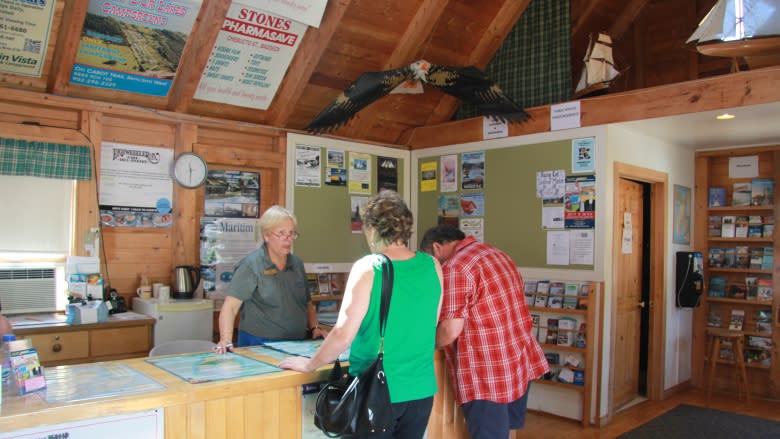'Trump Bump' in Cape Breton draws tourists, but few new residents
A three-ringed binder, tucked into the corner of a small visitor information centre in Nova Scotia, may contain the proof of what many Cape Bretoners have suspected — that more Americans are descending on the island this year.
And locals say Donald Trump is the reason.
All day, tourists flow in and out of the one-room visitor information centre in the village of Baddeck, asking for advice on what to see and how to make the most of nearby attractions. A glance at a visitors' book — marked "Where are you from?" in block capital letters — reveals various American locations: Connecticut, Florida, New York City.
Ally Harvie, who has been working at the centre for four years, says American tourism is up five to 10 per cent on some days over last year.
"Especially with the whole Trump thing where they've heard about Cape Breton — and so they wanted to come see it for themselves," she said.
What is the 'Trump Bump'?
The "whole Trump thing" that Harvie refers to is known in the tourism industry as the "Trump Bump." It was spurred by a simple website created a few months ago by a local radio DJ named Rob Calabrese, who invited Americans to move to Cape Breton if Trump is elected president of the United States.
The site generated a lot of buzz when it was launched in February — and CNN even sent a news crew to see what it was about.
Contemplating a move isn't just hype for Michael Riesch and Lily Jarman-Riesch. The Baltimore couple visited Nova Scotia 15 years ago and are here again, amid talk of what they'd do if Trump is elected.
"If he wins we need to leave the country, so we've been talking about where that would be," said Jarman-Riesch.
Although she and her husband enjoyed their trip, they say they find Cape Breton isolated and admit the harsh winters are a deterrent. Vancouver or other parts of Canada that are "a little more temperate" are better options, they say.
No matter where they end up, the couple have contributed to what Tourism Nova Scotia is describing as "tremendous" growth in visitor numbers so far this year — especially for Cape Breton.
Tourism numbers up
Room nights sold across the province rose by three per cent compared to the first half of 2015, but Cape Breton saw a boom of 16 per cent.
There was also a 12 per cent increase of visitors to Nova Scotia from the United States, while visitation from overseas declined seven per cent.
Although there are clearly many American tourists, it's harder to come by Americans who are actually following the website's advice and immigrating.
'They didn't translate into viewings'
Karen Gillies of Cape Breton Realty said she initially received a lot of inquiries after the website was launched.
"They didn't translate into any viewings or sales," she said. "Now it's no more than the norm. We get calls from Americans year-round."
But it's a different story for Danielle MacSween, an immigration lawyer with Sampson McPhee in Sydney. She said she's busy with requests from Americans who want to move to Cape Breton and she credits Calabrese for the island's increased exposure.
"The website is really what created the awareness about Cape Breton. Before that, Cape Breton was just this tiny little place no one really knew about," MacSween said.
"The website just blew us up for the better, I think."
Moving not always just talk
MacSween currently has six clients and their significant others who, since May, have contacted her and left the United States. They are hoping to stay in Cape Breton permanently but their immigration applications could take more than a year to process and there is no guarantee the federal government will accept them.
It's a situation Sher LeBay finds herself in.
From her rental property overlooking the Mira River, LeBay writes a weekly column for the Cape Breton Post, recounting her experiences as an American living in Cape Breton.
LeBay, who arrived from Arizona in May, can only stay in Cape Breton for six months due to Canadian immigration laws. Given that the island has experienced an out-migration for years, she said she should be able to stay longer.
"[Cape Breton] needs people who are willing to come and volunteer, like me, and contribute and spend money and pay rent and buy food and such," she said.
'I don't want to be in the middle of a fight'
"That's going to take a revisioning in Canada to do something like that. And I hope it comes from the Trudeau government."
She hadn't heard about Calabrese's website when she decided to move, but admits the politics in her native country motivated her to seek out something new.
"I don't want to be in the middle of a fight, in the middle of terrible racial tension."






